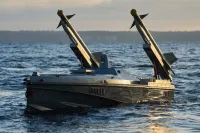Can Russia’s “little green men” and one professor wake Europe up?
global.espreso.tv
Thu, 16 Oct 2025 15:00:00 +0300

Contents1. Russia’s potential actions in a war against Europe: scenarios under discussion2. Consequences for Europe if Russia wins the war in Ukraine3. Key lesson: Russia’s war against Ukraine is a war against EuropeAlthough the term “little green men” has long become history and is strongly associated with the brazen occupation and annexation of Ukrainian Crimea in 2014, it has been mentioned again today. In Estonia, armed individuals in military uniforms without insignia were spotted near the border, sparking a strong reaction. Police blocked roads, and the public asked the key question: is this already a prelude to Russian aggression or merely a “hybrid” test of the resilience of Estonian and European response mechanisms? In light of recent drone attacks in European airspace, provocations by Russian fighter jets, and sabotage in European cities, the signal from Moscow is clear: the Kremlin is moving toward a systematic test of the resilience of NATO’s and the EU’s eastern flank.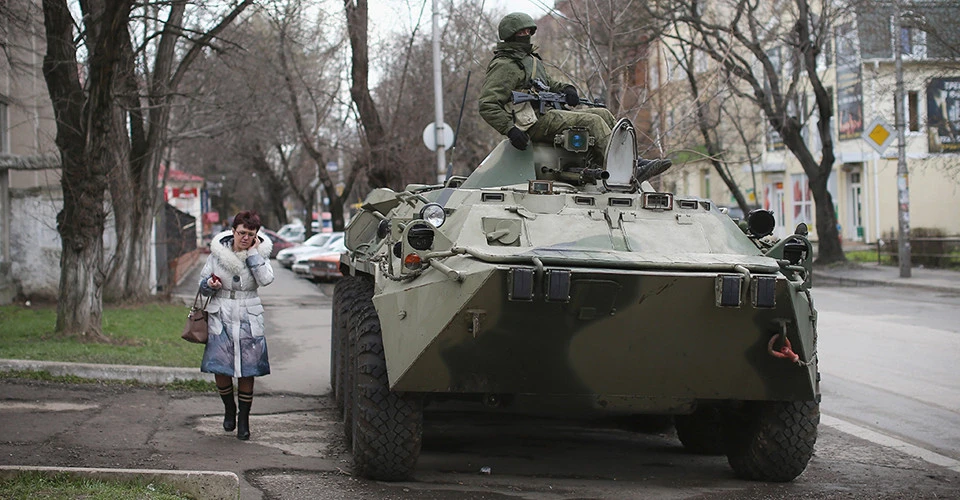 Russian APC in Simferopol, 2014, photo: Getty ImagesThe “little green men” incident at the Estonian border is a classic probe of the state system’s speed and effectiveness in responding. How will border guards, the military, police, territorial defense, and local authorities react? Moreover, how quickly and coherently does the state respond, and how synchronously do allies act? Meanwhile, in the European media space, publications discussing “what if Ukraine loses” are circulating. In the West, this is shaping a debate that is critically important for the future development of Western civilization.Russia’s potential actions in a war against Europe: scenarios under discussionOne of the catalysts for these discussions was Professor Carlo Masala’s book If Russia Wins: A Scenario, a short but impactful work that became a bestseller in Germany and the Netherlands. It models Russian aggression against Estonia in March 2028: two Russian brigades storm Narva, while “tourists” posing as civilians seize the Estonian island of Hiiumaa. Against the backdrop of Western capitals’ fatigue and the “settlement” imposed on Ukraine, the Kremlin tests whether the Alliance can uphold Article 5 when it concerns “only” a border city. Masala emphasizes that after a “victory” over Ukraine, the Kremlin could alter the geopolitical optics to avoid punishment — instead of Putin, a pseudo-liberal “new Gorbachev” becomes Russia’s president, and part of Europe may again be inclined to “forgive” the aggressor.
Russian APC in Simferopol, 2014, photo: Getty ImagesThe “little green men” incident at the Estonian border is a classic probe of the state system’s speed and effectiveness in responding. How will border guards, the military, police, territorial defense, and local authorities react? Moreover, how quickly and coherently does the state respond, and how synchronously do allies act? Meanwhile, in the European media space, publications discussing “what if Ukraine loses” are circulating. In the West, this is shaping a debate that is critically important for the future development of Western civilization.Russia’s potential actions in a war against Europe: scenarios under discussionOne of the catalysts for these discussions was Professor Carlo Masala’s book If Russia Wins: A Scenario, a short but impactful work that became a bestseller in Germany and the Netherlands. It models Russian aggression against Estonia in March 2028: two Russian brigades storm Narva, while “tourists” posing as civilians seize the Estonian island of Hiiumaa. Against the backdrop of Western capitals’ fatigue and the “settlement” imposed on Ukraine, the Kremlin tests whether the Alliance can uphold Article 5 when it concerns “only” a border city. Masala emphasizes that after a “victory” over Ukraine, the Kremlin could alter the geopolitical optics to avoid punishment — instead of Putin, a pseudo-liberal “new Gorbachev” becomes Russia’s president, and part of Europe may again be inclined to “forgive” the aggressor.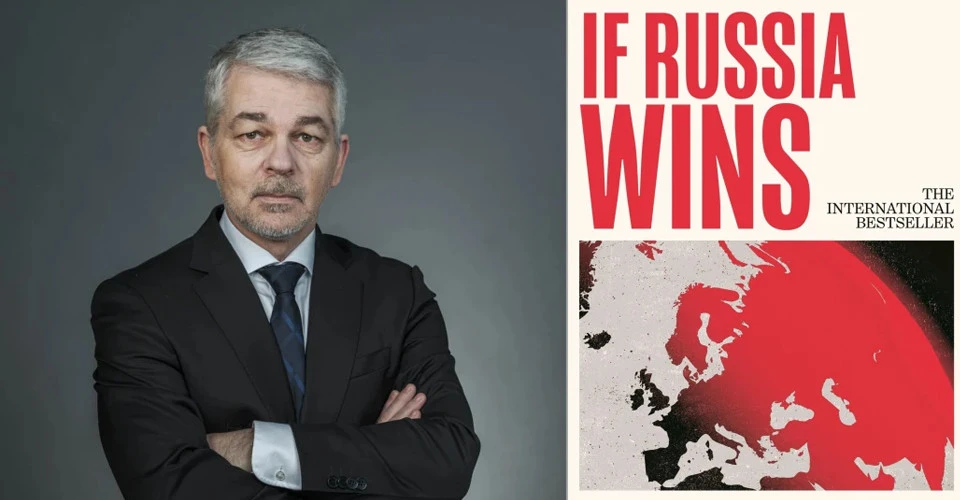 Carlo MasalaThis scenario echoes the warning of American columnist George F. Will in the Washington Post: Russia is already at war with Europe, and drones over airports and bases serve as combat reconnaissance. Moscow is testing whether the West will evade decisions and how quickly it will move from statements to action. Meanwhile, "accidents", sabotage, and maritime incidents occur — cumulatively a creeping escalation designed to exploit the slow pace of democracies.European think tanks add further assessments. The European Council on Foreign Relations (ECFR) outlined the consequences of a Russian “victory” early in 2025: a demoralized and chaotic Ukraine, a new wave of migration, toxic political processes, legalized Russian revisionism, and destabilization of Europe’s security system. London’s Chatham House, modeling potential war outcomes, warns that if U.S. support declines, a “Russian victory” could trigger a cascade of strategic consequences — from collective doubt in American guarantees to a catalogue of “gray zones” where the Kremlin expands its presence without open escalation.Discussions of potential scenarios in Europe “if Ukraine loses” are becoming increasingly realistic. Ten years ago, such modeling would have sparked protests from mainstream political forces in Germany or France, who feared it might “offend and provoke Russia.” Today, however, this scenario is one of the few realistic directions for current developments. The key point is that most Europeans now understand: a Russian “victory” over Ukraine is not about a new Russia-Ukraine border but about a new reality across Europe.Consequences for Europe if Russia wins the war in UkraineThe most obvious consequences are:1. Possible NATO collapse due to a trust crisis among Alliance members. NATO may be forced into direct confrontation with Russia in the Baltic theater. A “small-scale” aggression in an Estonian border town serves as the exact test where hesitation by some partners could undermine trust and the Alliance’s core principle of collective defense.2. Economy under pressure from risks. Investors will need to factor high risks of war into business models. Europe will involuntarily enter a “war economy” mode: sanctions, rearmament, investment shifting from social programs to defense industries, and use of frozen Russian assets. All of this will alter the European economic landscape. However, it is clear that a Ukrainian victory would be far cheaper than its defeat.3. Restless European seas and skies. “Shadow fleets” in the Baltic, drone provocations, and threats to underwater infrastructure will become the new normal. This affects insurance, tariffs, and shipping routes. If Russia continues to advance in Europe, all these factors will multiply significantly.
Carlo MasalaThis scenario echoes the warning of American columnist George F. Will in the Washington Post: Russia is already at war with Europe, and drones over airports and bases serve as combat reconnaissance. Moscow is testing whether the West will evade decisions and how quickly it will move from statements to action. Meanwhile, "accidents", sabotage, and maritime incidents occur — cumulatively a creeping escalation designed to exploit the slow pace of democracies.European think tanks add further assessments. The European Council on Foreign Relations (ECFR) outlined the consequences of a Russian “victory” early in 2025: a demoralized and chaotic Ukraine, a new wave of migration, toxic political processes, legalized Russian revisionism, and destabilization of Europe’s security system. London’s Chatham House, modeling potential war outcomes, warns that if U.S. support declines, a “Russian victory” could trigger a cascade of strategic consequences — from collective doubt in American guarantees to a catalogue of “gray zones” where the Kremlin expands its presence without open escalation.Discussions of potential scenarios in Europe “if Ukraine loses” are becoming increasingly realistic. Ten years ago, such modeling would have sparked protests from mainstream political forces in Germany or France, who feared it might “offend and provoke Russia.” Today, however, this scenario is one of the few realistic directions for current developments. The key point is that most Europeans now understand: a Russian “victory” over Ukraine is not about a new Russia-Ukraine border but about a new reality across Europe.Consequences for Europe if Russia wins the war in UkraineThe most obvious consequences are:1. Possible NATO collapse due to a trust crisis among Alliance members. NATO may be forced into direct confrontation with Russia in the Baltic theater. A “small-scale” aggression in an Estonian border town serves as the exact test where hesitation by some partners could undermine trust and the Alliance’s core principle of collective defense.2. Economy under pressure from risks. Investors will need to factor high risks of war into business models. Europe will involuntarily enter a “war economy” mode: sanctions, rearmament, investment shifting from social programs to defense industries, and use of frozen Russian assets. All of this will alter the European economic landscape. However, it is clear that a Ukrainian victory would be far cheaper than its defeat.3. Restless European seas and skies. “Shadow fleets” in the Baltic, drone provocations, and threats to underwater infrastructure will become the new normal. This affects insurance, tariffs, and shipping routes. If Russia continues to advance in Europe, all these factors will multiply significantly.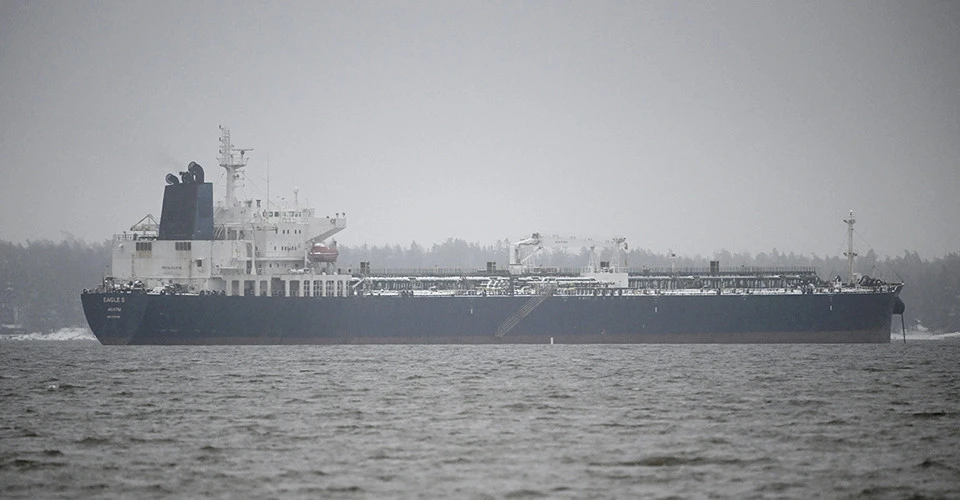 Russian “shadow fleet” oil tanker Eagle S, photo: Getty Images4. Political erosion. A rise of fringe forces in key countries will slow decisions on defense and support for Ukraine. The Kremlin will continue to exploit divisions in Europe, stoking migration crises and energy fears — exactly as described in “Ukraine loses” scenarios.5. A precedent of impunity. If a “success” in Ukraine is legitimized, rewarding aggression will encourage new Kremlin adventures — from the Caucasus to the Arctic. Once the taboo against changing borders by force is broken, every “gray zone” becomes a platform for blackmail and armed provocations.What should Europe do now?Call things by their names. Russia’s war against Europe must be called a war. Using the term “hybrid war” may be psychologically comforting, but it blocks practical measures to counter and deter Russia. While we hide behind the word “hybrid,” Moscow acts by the laws of wartime. Legal regimes, defense planning, budgets and industry must correspond to the real state of affairs on the European theater.Build a layered, effective counter‑drone air defense system. Symbolic programs like “drone walls” may soothe politicians. What’s needed is a real, frontline system based on Ukrainian experience: from radar stations and mobile fire units to EW and “digital perimeters” around critical sites. Common standards, joint procurement, interoperability of weapons and clear division of responsibilities are the keys to rapid results.Support Ukraine as the best insurance against a larger war. Russia counts on exhaustion and a protracted low‑intensity conflict. The only answer is a long‑term, predictable assistance package for Ukraine: ammunition, air defense, radars, EW, long‑range strike capabilities, repair and production capacities in Ukraine and the EU. A Ukrainian victory will cost Europe far less than its defeat.Systematic countermeasures against Russian sabotage. Ports, energy, communications, and railways are traditional targets for Russian intelligence. Europe often underestimates this. That’s why joint rapid‑response procedures are needed: comprehensive measures against “shadow fleet” vessels, cutting off financing channels for proxy networks, criminal prosecution of agent networks, and protection of undersea infrastructure in coordination with the private sector.Have an honest conversation with the public. Russia skillfully plays on European fatigue with “the Ukrainian war.” European politicians have one chance to neutralize Russian influence — to honestly explain that as long as Russia can continue aggression against Ukraine, the likelihood of a major war in Europe increases (not decreases, as Orbán and other Russian influence agents in the EU claim). Europeans must understand clearly: it is wiser today to invest in defense and aid to Ukraine than later to fight Russian savages on the streets of European cities.Development of the European defense industry. Europe needs joint orders for ammunition, air defense and anti‑drone systems, new production lines, interoperability standards, fast certification procedures, and tax incentives for private investment. Joint programs with Ukraine not only support the front but also accelerate the cycle from research to combat systems.Key lesson: Russia’s war against Ukraine is a war against EuropeEvents around Estonia, drones over airports, and suspicious “incidents” at sea are all part of the same picture. So far, Russia is testing NATO’s response speed and the resilience of European societies: how effectively border guards act, how long governments take to make decisions, what Washington will say, whether there are disagreements between Paris and Berlin, how steadfast Warsaw is, and how the Scandinavians respond.“Post‑Ukraine defeat” scenarios studied by think tanks and discussed in the media reflect growing tension in Western academic and public circles. Their main value lies in the question itself: is it really in Europe’s interest to “abandon” Ukraine, as some European populists suggest? The policy of “appeasing the aggressor” has supporters in Europe. In fact, Ukraine’s defeat would bring a major war far closer to the EU.Europe has all the tools to thwart Russia’s plans: from scaling up defense production to a joint counter‑drone system; from robust logistics and infrastructure protection to preventing sabotage and communicating honestly with the public. In any case, the key element of Europe’s strategy must be systematic and comprehensive support for Ukraine to make any “if Ukraine loses” scenarios impossible.
Russian “shadow fleet” oil tanker Eagle S, photo: Getty Images4. Political erosion. A rise of fringe forces in key countries will slow decisions on defense and support for Ukraine. The Kremlin will continue to exploit divisions in Europe, stoking migration crises and energy fears — exactly as described in “Ukraine loses” scenarios.5. A precedent of impunity. If a “success” in Ukraine is legitimized, rewarding aggression will encourage new Kremlin adventures — from the Caucasus to the Arctic. Once the taboo against changing borders by force is broken, every “gray zone” becomes a platform for blackmail and armed provocations.What should Europe do now?Call things by their names. Russia’s war against Europe must be called a war. Using the term “hybrid war” may be psychologically comforting, but it blocks practical measures to counter and deter Russia. While we hide behind the word “hybrid,” Moscow acts by the laws of wartime. Legal regimes, defense planning, budgets and industry must correspond to the real state of affairs on the European theater.Build a layered, effective counter‑drone air defense system. Symbolic programs like “drone walls” may soothe politicians. What’s needed is a real, frontline system based on Ukrainian experience: from radar stations and mobile fire units to EW and “digital perimeters” around critical sites. Common standards, joint procurement, interoperability of weapons and clear division of responsibilities are the keys to rapid results.Support Ukraine as the best insurance against a larger war. Russia counts on exhaustion and a protracted low‑intensity conflict. The only answer is a long‑term, predictable assistance package for Ukraine: ammunition, air defense, radars, EW, long‑range strike capabilities, repair and production capacities in Ukraine and the EU. A Ukrainian victory will cost Europe far less than its defeat.Systematic countermeasures against Russian sabotage. Ports, energy, communications, and railways are traditional targets for Russian intelligence. Europe often underestimates this. That’s why joint rapid‑response procedures are needed: comprehensive measures against “shadow fleet” vessels, cutting off financing channels for proxy networks, criminal prosecution of agent networks, and protection of undersea infrastructure in coordination with the private sector.Have an honest conversation with the public. Russia skillfully plays on European fatigue with “the Ukrainian war.” European politicians have one chance to neutralize Russian influence — to honestly explain that as long as Russia can continue aggression against Ukraine, the likelihood of a major war in Europe increases (not decreases, as Orbán and other Russian influence agents in the EU claim). Europeans must understand clearly: it is wiser today to invest in defense and aid to Ukraine than later to fight Russian savages on the streets of European cities.Development of the European defense industry. Europe needs joint orders for ammunition, air defense and anti‑drone systems, new production lines, interoperability standards, fast certification procedures, and tax incentives for private investment. Joint programs with Ukraine not only support the front but also accelerate the cycle from research to combat systems.Key lesson: Russia’s war against Ukraine is a war against EuropeEvents around Estonia, drones over airports, and suspicious “incidents” at sea are all part of the same picture. So far, Russia is testing NATO’s response speed and the resilience of European societies: how effectively border guards act, how long governments take to make decisions, what Washington will say, whether there are disagreements between Paris and Berlin, how steadfast Warsaw is, and how the Scandinavians respond.“Post‑Ukraine defeat” scenarios studied by think tanks and discussed in the media reflect growing tension in Western academic and public circles. Their main value lies in the question itself: is it really in Europe’s interest to “abandon” Ukraine, as some European populists suggest? The policy of “appeasing the aggressor” has supporters in Europe. In fact, Ukraine’s defeat would bring a major war far closer to the EU.Europe has all the tools to thwart Russia’s plans: from scaling up defense production to a joint counter‑drone system; from robust logistics and infrastructure protection to preventing sabotage and communicating honestly with the public. In any case, the key element of Europe’s strategy must be systematic and comprehensive support for Ukraine to make any “if Ukraine loses” scenarios impossible.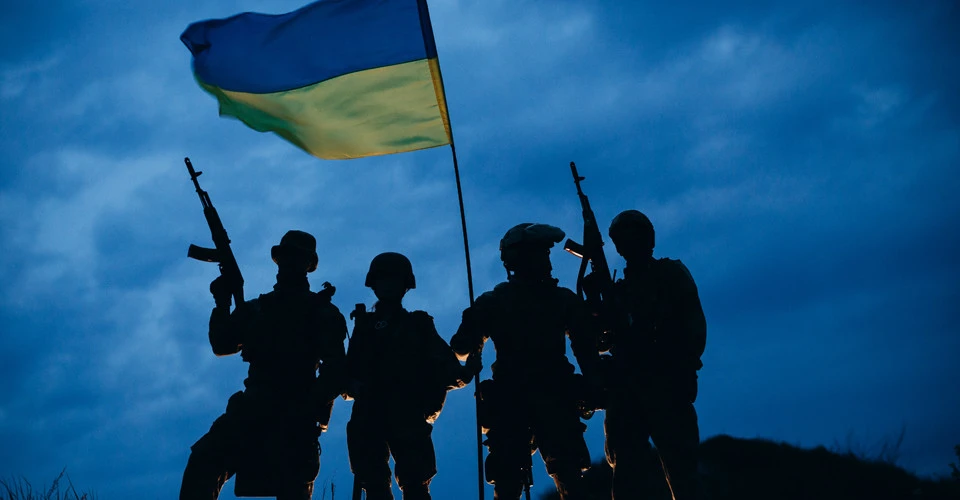 Armed Forces of Ukraine, photo: Getty ImagesThe material was prepared in cooperation with the Consortium for Defense Information (CDI), a project that unites Ukrainian analytical and research organizations and aims to strengthen informational support and analytical capacity in the fields of national security, defense, and geopolitics.
Armed Forces of Ukraine, photo: Getty ImagesThe material was prepared in cooperation with the Consortium for Defense Information (CDI), a project that unites Ukrainian analytical and research organizations and aims to strengthen informational support and analytical capacity in the fields of national security, defense, and geopolitics.
 Russian APC in Simferopol, 2014, photo: Getty ImagesThe “little green men” incident at the Estonian border is a classic probe of the state system’s speed and effectiveness in responding. How will border guards, the military, police, territorial defense, and local authorities react? Moreover, how quickly and coherently does the state respond, and how synchronously do allies act? Meanwhile, in the European media space, publications discussing “what if Ukraine loses” are circulating. In the West, this is shaping a debate that is critically important for the future development of Western civilization.Russia’s potential actions in a war against Europe: scenarios under discussionOne of the catalysts for these discussions was Professor Carlo Masala’s book If Russia Wins: A Scenario, a short but impactful work that became a bestseller in Germany and the Netherlands. It models Russian aggression against Estonia in March 2028: two Russian brigades storm Narva, while “tourists” posing as civilians seize the Estonian island of Hiiumaa. Against the backdrop of Western capitals’ fatigue and the “settlement” imposed on Ukraine, the Kremlin tests whether the Alliance can uphold Article 5 when it concerns “only” a border city. Masala emphasizes that after a “victory” over Ukraine, the Kremlin could alter the geopolitical optics to avoid punishment — instead of Putin, a pseudo-liberal “new Gorbachev” becomes Russia’s president, and part of Europe may again be inclined to “forgive” the aggressor.
Russian APC in Simferopol, 2014, photo: Getty ImagesThe “little green men” incident at the Estonian border is a classic probe of the state system’s speed and effectiveness in responding. How will border guards, the military, police, territorial defense, and local authorities react? Moreover, how quickly and coherently does the state respond, and how synchronously do allies act? Meanwhile, in the European media space, publications discussing “what if Ukraine loses” are circulating. In the West, this is shaping a debate that is critically important for the future development of Western civilization.Russia’s potential actions in a war against Europe: scenarios under discussionOne of the catalysts for these discussions was Professor Carlo Masala’s book If Russia Wins: A Scenario, a short but impactful work that became a bestseller in Germany and the Netherlands. It models Russian aggression against Estonia in March 2028: two Russian brigades storm Narva, while “tourists” posing as civilians seize the Estonian island of Hiiumaa. Against the backdrop of Western capitals’ fatigue and the “settlement” imposed on Ukraine, the Kremlin tests whether the Alliance can uphold Article 5 when it concerns “only” a border city. Masala emphasizes that after a “victory” over Ukraine, the Kremlin could alter the geopolitical optics to avoid punishment — instead of Putin, a pseudo-liberal “new Gorbachev” becomes Russia’s president, and part of Europe may again be inclined to “forgive” the aggressor. Carlo MasalaThis scenario echoes the warning of American columnist George F. Will in the Washington Post: Russia is already at war with Europe, and drones over airports and bases serve as combat reconnaissance. Moscow is testing whether the West will evade decisions and how quickly it will move from statements to action. Meanwhile, "accidents", sabotage, and maritime incidents occur — cumulatively a creeping escalation designed to exploit the slow pace of democracies.European think tanks add further assessments. The European Council on Foreign Relations (ECFR) outlined the consequences of a Russian “victory” early in 2025: a demoralized and chaotic Ukraine, a new wave of migration, toxic political processes, legalized Russian revisionism, and destabilization of Europe’s security system. London’s Chatham House, modeling potential war outcomes, warns that if U.S. support declines, a “Russian victory” could trigger a cascade of strategic consequences — from collective doubt in American guarantees to a catalogue of “gray zones” where the Kremlin expands its presence without open escalation.Discussions of potential scenarios in Europe “if Ukraine loses” are becoming increasingly realistic. Ten years ago, such modeling would have sparked protests from mainstream political forces in Germany or France, who feared it might “offend and provoke Russia.” Today, however, this scenario is one of the few realistic directions for current developments. The key point is that most Europeans now understand: a Russian “victory” over Ukraine is not about a new Russia-Ukraine border but about a new reality across Europe.Consequences for Europe if Russia wins the war in UkraineThe most obvious consequences are:1. Possible NATO collapse due to a trust crisis among Alliance members. NATO may be forced into direct confrontation with Russia in the Baltic theater. A “small-scale” aggression in an Estonian border town serves as the exact test where hesitation by some partners could undermine trust and the Alliance’s core principle of collective defense.2. Economy under pressure from risks. Investors will need to factor high risks of war into business models. Europe will involuntarily enter a “war economy” mode: sanctions, rearmament, investment shifting from social programs to defense industries, and use of frozen Russian assets. All of this will alter the European economic landscape. However, it is clear that a Ukrainian victory would be far cheaper than its defeat.3. Restless European seas and skies. “Shadow fleets” in the Baltic, drone provocations, and threats to underwater infrastructure will become the new normal. This affects insurance, tariffs, and shipping routes. If Russia continues to advance in Europe, all these factors will multiply significantly.
Carlo MasalaThis scenario echoes the warning of American columnist George F. Will in the Washington Post: Russia is already at war with Europe, and drones over airports and bases serve as combat reconnaissance. Moscow is testing whether the West will evade decisions and how quickly it will move from statements to action. Meanwhile, "accidents", sabotage, and maritime incidents occur — cumulatively a creeping escalation designed to exploit the slow pace of democracies.European think tanks add further assessments. The European Council on Foreign Relations (ECFR) outlined the consequences of a Russian “victory” early in 2025: a demoralized and chaotic Ukraine, a new wave of migration, toxic political processes, legalized Russian revisionism, and destabilization of Europe’s security system. London’s Chatham House, modeling potential war outcomes, warns that if U.S. support declines, a “Russian victory” could trigger a cascade of strategic consequences — from collective doubt in American guarantees to a catalogue of “gray zones” where the Kremlin expands its presence without open escalation.Discussions of potential scenarios in Europe “if Ukraine loses” are becoming increasingly realistic. Ten years ago, such modeling would have sparked protests from mainstream political forces in Germany or France, who feared it might “offend and provoke Russia.” Today, however, this scenario is one of the few realistic directions for current developments. The key point is that most Europeans now understand: a Russian “victory” over Ukraine is not about a new Russia-Ukraine border but about a new reality across Europe.Consequences for Europe if Russia wins the war in UkraineThe most obvious consequences are:1. Possible NATO collapse due to a trust crisis among Alliance members. NATO may be forced into direct confrontation with Russia in the Baltic theater. A “small-scale” aggression in an Estonian border town serves as the exact test where hesitation by some partners could undermine trust and the Alliance’s core principle of collective defense.2. Economy under pressure from risks. Investors will need to factor high risks of war into business models. Europe will involuntarily enter a “war economy” mode: sanctions, rearmament, investment shifting from social programs to defense industries, and use of frozen Russian assets. All of this will alter the European economic landscape. However, it is clear that a Ukrainian victory would be far cheaper than its defeat.3. Restless European seas and skies. “Shadow fleets” in the Baltic, drone provocations, and threats to underwater infrastructure will become the new normal. This affects insurance, tariffs, and shipping routes. If Russia continues to advance in Europe, all these factors will multiply significantly. Russian “shadow fleet” oil tanker Eagle S, photo: Getty Images4. Political erosion. A rise of fringe forces in key countries will slow decisions on defense and support for Ukraine. The Kremlin will continue to exploit divisions in Europe, stoking migration crises and energy fears — exactly as described in “Ukraine loses” scenarios.5. A precedent of impunity. If a “success” in Ukraine is legitimized, rewarding aggression will encourage new Kremlin adventures — from the Caucasus to the Arctic. Once the taboo against changing borders by force is broken, every “gray zone” becomes a platform for blackmail and armed provocations.What should Europe do now?Call things by their names. Russia’s war against Europe must be called a war. Using the term “hybrid war” may be psychologically comforting, but it blocks practical measures to counter and deter Russia. While we hide behind the word “hybrid,” Moscow acts by the laws of wartime. Legal regimes, defense planning, budgets and industry must correspond to the real state of affairs on the European theater.Build a layered, effective counter‑drone air defense system. Symbolic programs like “drone walls” may soothe politicians. What’s needed is a real, frontline system based on Ukrainian experience: from radar stations and mobile fire units to EW and “digital perimeters” around critical sites. Common standards, joint procurement, interoperability of weapons and clear division of responsibilities are the keys to rapid results.Support Ukraine as the best insurance against a larger war. Russia counts on exhaustion and a protracted low‑intensity conflict. The only answer is a long‑term, predictable assistance package for Ukraine: ammunition, air defense, radars, EW, long‑range strike capabilities, repair and production capacities in Ukraine and the EU. A Ukrainian victory will cost Europe far less than its defeat.Systematic countermeasures against Russian sabotage. Ports, energy, communications, and railways are traditional targets for Russian intelligence. Europe often underestimates this. That’s why joint rapid‑response procedures are needed: comprehensive measures against “shadow fleet” vessels, cutting off financing channels for proxy networks, criminal prosecution of agent networks, and protection of undersea infrastructure in coordination with the private sector.Have an honest conversation with the public. Russia skillfully plays on European fatigue with “the Ukrainian war.” European politicians have one chance to neutralize Russian influence — to honestly explain that as long as Russia can continue aggression against Ukraine, the likelihood of a major war in Europe increases (not decreases, as Orbán and other Russian influence agents in the EU claim). Europeans must understand clearly: it is wiser today to invest in defense and aid to Ukraine than later to fight Russian savages on the streets of European cities.Development of the European defense industry. Europe needs joint orders for ammunition, air defense and anti‑drone systems, new production lines, interoperability standards, fast certification procedures, and tax incentives for private investment. Joint programs with Ukraine not only support the front but also accelerate the cycle from research to combat systems.Key lesson: Russia’s war against Ukraine is a war against EuropeEvents around Estonia, drones over airports, and suspicious “incidents” at sea are all part of the same picture. So far, Russia is testing NATO’s response speed and the resilience of European societies: how effectively border guards act, how long governments take to make decisions, what Washington will say, whether there are disagreements between Paris and Berlin, how steadfast Warsaw is, and how the Scandinavians respond.“Post‑Ukraine defeat” scenarios studied by think tanks and discussed in the media reflect growing tension in Western academic and public circles. Their main value lies in the question itself: is it really in Europe’s interest to “abandon” Ukraine, as some European populists suggest? The policy of “appeasing the aggressor” has supporters in Europe. In fact, Ukraine’s defeat would bring a major war far closer to the EU.Europe has all the tools to thwart Russia’s plans: from scaling up defense production to a joint counter‑drone system; from robust logistics and infrastructure protection to preventing sabotage and communicating honestly with the public. In any case, the key element of Europe’s strategy must be systematic and comprehensive support for Ukraine to make any “if Ukraine loses” scenarios impossible.
Russian “shadow fleet” oil tanker Eagle S, photo: Getty Images4. Political erosion. A rise of fringe forces in key countries will slow decisions on defense and support for Ukraine. The Kremlin will continue to exploit divisions in Europe, stoking migration crises and energy fears — exactly as described in “Ukraine loses” scenarios.5. A precedent of impunity. If a “success” in Ukraine is legitimized, rewarding aggression will encourage new Kremlin adventures — from the Caucasus to the Arctic. Once the taboo against changing borders by force is broken, every “gray zone” becomes a platform for blackmail and armed provocations.What should Europe do now?Call things by their names. Russia’s war against Europe must be called a war. Using the term “hybrid war” may be psychologically comforting, but it blocks practical measures to counter and deter Russia. While we hide behind the word “hybrid,” Moscow acts by the laws of wartime. Legal regimes, defense planning, budgets and industry must correspond to the real state of affairs on the European theater.Build a layered, effective counter‑drone air defense system. Symbolic programs like “drone walls” may soothe politicians. What’s needed is a real, frontline system based on Ukrainian experience: from radar stations and mobile fire units to EW and “digital perimeters” around critical sites. Common standards, joint procurement, interoperability of weapons and clear division of responsibilities are the keys to rapid results.Support Ukraine as the best insurance against a larger war. Russia counts on exhaustion and a protracted low‑intensity conflict. The only answer is a long‑term, predictable assistance package for Ukraine: ammunition, air defense, radars, EW, long‑range strike capabilities, repair and production capacities in Ukraine and the EU. A Ukrainian victory will cost Europe far less than its defeat.Systematic countermeasures against Russian sabotage. Ports, energy, communications, and railways are traditional targets for Russian intelligence. Europe often underestimates this. That’s why joint rapid‑response procedures are needed: comprehensive measures against “shadow fleet” vessels, cutting off financing channels for proxy networks, criminal prosecution of agent networks, and protection of undersea infrastructure in coordination with the private sector.Have an honest conversation with the public. Russia skillfully plays on European fatigue with “the Ukrainian war.” European politicians have one chance to neutralize Russian influence — to honestly explain that as long as Russia can continue aggression against Ukraine, the likelihood of a major war in Europe increases (not decreases, as Orbán and other Russian influence agents in the EU claim). Europeans must understand clearly: it is wiser today to invest in defense and aid to Ukraine than later to fight Russian savages on the streets of European cities.Development of the European defense industry. Europe needs joint orders for ammunition, air defense and anti‑drone systems, new production lines, interoperability standards, fast certification procedures, and tax incentives for private investment. Joint programs with Ukraine not only support the front but also accelerate the cycle from research to combat systems.Key lesson: Russia’s war against Ukraine is a war against EuropeEvents around Estonia, drones over airports, and suspicious “incidents” at sea are all part of the same picture. So far, Russia is testing NATO’s response speed and the resilience of European societies: how effectively border guards act, how long governments take to make decisions, what Washington will say, whether there are disagreements between Paris and Berlin, how steadfast Warsaw is, and how the Scandinavians respond.“Post‑Ukraine defeat” scenarios studied by think tanks and discussed in the media reflect growing tension in Western academic and public circles. Their main value lies in the question itself: is it really in Europe’s interest to “abandon” Ukraine, as some European populists suggest? The policy of “appeasing the aggressor” has supporters in Europe. In fact, Ukraine’s defeat would bring a major war far closer to the EU.Europe has all the tools to thwart Russia’s plans: from scaling up defense production to a joint counter‑drone system; from robust logistics and infrastructure protection to preventing sabotage and communicating honestly with the public. In any case, the key element of Europe’s strategy must be systematic and comprehensive support for Ukraine to make any “if Ukraine loses” scenarios impossible. Armed Forces of Ukraine, photo: Getty ImagesThe material was prepared in cooperation with the Consortium for Defense Information (CDI), a project that unites Ukrainian analytical and research organizations and aims to strengthen informational support and analytical capacity in the fields of national security, defense, and geopolitics.
Armed Forces of Ukraine, photo: Getty ImagesThe material was prepared in cooperation with the Consortium for Defense Information (CDI), a project that unites Ukrainian analytical and research organizations and aims to strengthen informational support and analytical capacity in the fields of national security, defense, and geopolitics.









